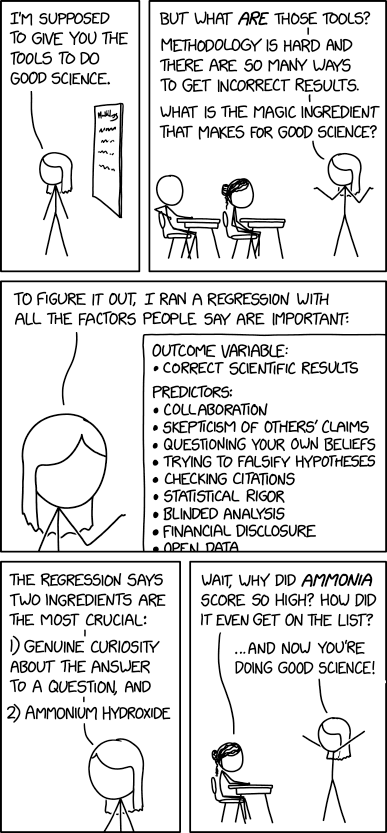#3101: Good Science
Permalink
Transcript
[Miss Lenhart is standing in front of a whiteboard with some scribbles on it. She is looking away from it.]
Miss Lenhart: I'm supposed to give you the tools to do good science.
[Miss Lenhart is now seen standing in front of Jill and Cueball, who are seated at classroom desks. She is shrugging and has her arms up and looking away from board.]
Miss Lenhart: But what are those tools?
Miss Lenhart: Methodology is hard and there are so many ways to get incorrect results.
Miss Lenhart: What is the magic ingredient that makes for good science?
[Miss Lenhart headshot.]
Miss Lenhart: To figure it out, I ran a regression with all the factors people say are important:
[A list, presented in a sub-panel that Miss Lenhart is pointing to:]
Outcome variable:
• correct scientific results
Predictors:
• collaboration
• skepticism of others' claims
• questioning your own beliefs
• trying to falsify hypotheses
• checking citations
• statistical rigor
• blinded analysis
• financial disclosure
• open data
[presumably the list goes on, as it runs off the visible part of the panel]
[Another Miss Lenhart headshot.]
Miss Lenhart: The regression says two ingredients are the most crucial:
1) genuine curiosity about the answer to a question, and
2) ammonium hydroxide
[Miss Lenhart is standing and Jill is seated at desk]
Jill: Wait, why did ammonia score so high? How did it even get on the list?
Miss Lenhart: ...and now you're doing good science!
(Sourced from explainxkcd.com)
Title text:If you think curiosity without rigor is bad, you should see rigor without curiosity.